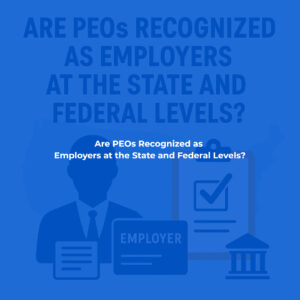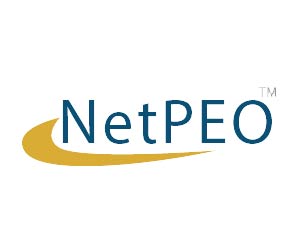Running a business today isn’t just about delivering products and services—it’s about managing people, payroll, taxes, compliance, and benefits. For many small and mid-sized businesses, that administrative burden becomes overwhelming, which is why thousands of companies turn to Professional Employer Organizations (PEOs).
But here’s one question that comes up again and again:
👉 “Are PEOs legally recognized as employers at both the state and federal levels?”
The short answer: Yes—but not in the same way as you, the business owner.
This article will break down exactly how PEO providers are treated under state and federal law, what it means for your business, and why working with a broker like NetPEO ensures you get the right partner to stay compliant while reducing costs.
What Is a PEO, Really?
A PEO enters into a co-employment relationship with your company. That means:
-
You still run your business, manage employees’ daily work, and make all hiring/firing decisions.
-
The PEO handles HR administration, human resource outsourcing, payroll processing, tax filings, benefits, workers’ comp, and compliance.
Legally, this “co-employment” means your employees are shared between you and the PEO for different purposes. The question is: who is recognized as the employer?
When you’re partnering with a PEO, you gain a business partner that takes on many back-office employer responsibilities while you remain focused on growth and operations.
Employer Recognition at the Federal Level
At the federal level, PEO companies are recognized as employers for specific administrative and tax purposes. Let’s break it down.
1. IRS Certification of PEO companies
In 2014, Congress passed the Small Business Efficiency Act (SBEA). This created the Certified Professional Employer Organization (CPEO) program through the IRS.
-
A CPEO is officially recognized by the IRS as the employer for purposes of federal payroll taxes.
-
That means the PEO—not your business—is responsible for:
-
Collecting and remitting federal employment taxes
-
Issuing W-2s
-
Ensuring compliance with federal wage reporting
-
Why it matters to you: If a PEO is certified, you don’t have to worry about double taxation or liability if the PEO mishandles payroll taxes. The IRS places responsibility on the PEO.
2. Federal Labor Laws
When it comes to labor laws like the FLSA (Fair Labor Standards Act), FMLA (Family and Medical Leave Act), and Title VII discrimination protections:
-
Both you and the PEO may be considered “joint employers.”
-
That means employees are protected under these laws, and both parties may share responsibilities.
So while the PEO is recognized as an employer for administrative purposes, you remain the employer for operational control. This split in employer responsibilities protects both you and your employees.
Employer Recognition at the State Level
Each state views PEO providers a little differently, but most have laws clearly defining how PEO relationships work.
1. Licensing and Registration
Many states require PEO companies to be licensed or registered. For example:
-
Florida: PEO providers must be licensed through the Florida Department of Business and Professional Regulation.
-
Texas: PEO companies are regulated by the Texas Department of Licensing and Regulation.
-
California: PEO companies must register with the California Employment Development Department.
This ensures that PEO companies are legally recognized and monitored for compliance.
2. State Payroll Taxes
Just like at the federal level, many states recognize the PEO as the “employer of record” for payroll tax purposes. That means:
-
The PEO files state unemployment insurance taxes.
-
The PEO reports wages under its own tax ID number.
This helps your business avoid mistakes and penalties.
3. Workers’ Compensation and Benefits
In most states:
-
The PEO is recognized as the employer for workers’ comp insurance.
-
This gives small businesses access to large-group pricing.
-
Employees are covered under the PEO companies policy, while you maintain workplace safety responsibility.
And because a PEO can pool employees from multiple companies, your team gains access to health insurance and employee benefits that rival Fortune 500 companies.
Employer of Record vs. Common Law Employer
Here’s where many business owners get confused:
-
Employer of Record (EOR): The PEO is recognized for payroll, tax filings, and benefits.
-
Common Law Employer: You, the business owner, are recognized as the true employer in terms of daily management, hiring, firing, and business decisions.
Think of it as a division of labor:
-
You: Control the business, employee leasing, manage staff, make strategic decisions.
-
PEO: Handles the paperwork, compliance, and tax side.
This partnership ensures your hr management and human resource needs are handled without taking away your authority as the business owner.
Why Employer Recognition Matters for Your Business
Understanding who is recognized as the employer is more than a legal technicality—it directly impacts your bottom line.
✅ Payroll Accuracy and Compliance
If a PEO is IRS-certified, you can rest easy knowing your payroll taxes are handled correctly. Mistakes here can cost thousands in penalties.
✅ HR and Legal Protection
Since Outsourced HR firms are recognized as co-employers, they share liability on compliance matters. That means you’re not facing HR challenges alone. With a PEO as your business partner, you get professional hr services that protect your company from costly mistakes.
✅ Benefits Access
PEO companies recognized at the state level can pool employees across multiple small businesses to secure enterprise-level benefits packages like health insurance and retirement plans—something most small businesses can’t afford on their own.
✅ Reduced Employee Turnover
Better employee benefits and stronger compliance reduce employee turnover. When your team feels secure about their pay, benefits, and workplace protections, they’re far more likely to stay.
✅ Reduced Administrative Burden
Because the PEO is legally recognized for filings and taxes, your team spends less time on paperwork and more time growing the business.
The NetPEO Advantage: Why Work With a Broker?
Here’s the challenge: Not all PEOs are equal.
-
Some are IRS-certified (CPEOs).
-
Some have stronger benefits networks.
-
Some specialize in certain industries or states.
If you pick the wrong PEO, you could face:
-
Higher costs
-
Compliance risks
-
Poor HR support
That’s where NetPEO comes in.
How NetPEO Helps:
-
We’re a PEO broker, which means we work with hundreds of Outsourced HR firms nationwide.
-
We help you compare options to ensure your PEO is recognized and compliant at the state and federal levels.
-
We negotiate on your behalf to secure lower rates and better benefits.
-
Our team stays with you, providing ongoing support—not just a one-time match.
With NetPEO, you don’t have to figure out the legal complexities of hr management and compliance alone. We’ve done the homework so you can focus on growth. We create solutions so that you can focus on your business while your PEO handles employer responsibilities according to professional employer organizations NAPEO standards.
Common Questions About PEO Employer Recognition
1. Does working with a PEO mean I lose control of my employees?
No. You remain the decision-maker for all day-to-day operations. The PEO is only recognized as the employer for compliance and tax purposes.
2. Is every PEO IRS-certified?
No. Only CPEOs have this recognition. NetPEO can help you decide if a certified PEO is the right choice for your business.
3. What happens if my state doesn’t regulate PEOs?
Some states have limited regulations, but PEO companies still operate under federal law. NetPEO helps ensure your PEO is trustworthy and compliant.
4. Will my employees know they work for the PEO?
Employees remain part of your company. Their paychecks and benefits may come from the PEO, but their loyalty and daily direction stay with you.
Final Thoughts: Recognition Equals Protection
So, are PEO providers recognized as employers at the state and federal levels?
Yes—but in different ways.
-
At the federal level, PEO providers (especially CPEOs) are recognized as employers for tax purposes.
-
At the state level, PEO providers are often recognized for payroll taxes, workers’ comp, and benefits.
-
But you remain the common-law employer—the one who runs the business and manages people.
This co-employment structure gives you the best of both worlds: control and compliance. By outsourcing human resource and administrative functions to a PEO, you gain the freedom to focus on growth.
Ready to Find the Right PEO for Your Business?
Choosing the wrong PEO can leave you with compliance headaches, higher costs, and frustrated employees. But with NetPEO, you don’t take that risk.
We’ll match you with the best PEO providers in your state, ensure they’re recognized under the right laws, and help you secure the lowest possible rates.
👉 Take the first step today.
Fill out our quick form or call us, and let’s find the perfect PEO for your business.
NetPEO – Your Trusted PEO Broker.


